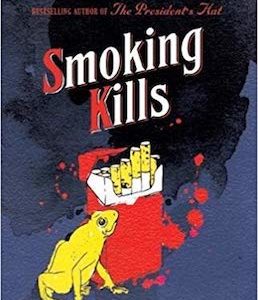In George Orwell’s 1984, one of the main characters famously says, “If you want a vision of the future, imagine a boot stamping on a human face—forever.” In writing my debut novel, Game of the Gods, that boot was firmly etched in my mind. This is probably true for many science fiction writers crafting futuristic political landscapes, particularly those writing dystopian novels. By its very definition, dystopian novels, a mainstay of science fiction, imagine worlds filled with injustice, suffering, and inequality. At best, those in power are indifferent to this suffering. At worst, their boots are firmly pressed against the face of humanity.
It doesn’t require enormous feats of imagination to envision futures that resemble our past and present. Writing in 1949 about a future in 1984, Orwell clearly foresaw the post-truth political environment of today. He predicted better than most how easily fact could become fiction and fiction fact. In his 1946 essay Politics and the English Language, Orwell provided a blueprint for how political actors use language to manipulate truth. Orwell’s essay is a must-read for any aspiring writer interested in building new political worlds or thinking about old ones.
Like Orwell, the best science fiction writers unearth existing social flaws and lay them bare for the world to see. These works address modern social ills—racial bias, gender inequality, totalitarianism, tribalism—but set them in strange lands in the future. The settings may be remote or otherworldly, but they speak to us today. Perhaps when the mirror seems further away, it is easier to see the truth.
The tools of the thriller trade are used to create an atmosphere where political themes like powerlessness, isolation, fear, and terror can be viscerally experienced by the reader.Sci-fi writers frequently tackle important political issues like oppression, alienation, and exclusion. Sometimes this staple sci-fi fare is served up in the form of a thriller. A woman desperately wants to find the truth behind the sexist world she inhabits. A tyrannical regime forces teenage citizens to fight to the death. A man committed to his totalitarian state comes to see the truth … but it’s too late. These themes of oppression, alienation, and exclusion are often developed using the narrative techniques of the thriller. Suspense, political intrigue, apprehension, tension, and perhaps the most indispensable of crafts, unpredictable twists and turns, fill the pages of some of the best political sci-fi.
In the novels discussed below, the writers blend traditional elements of politically-themed science fiction with thrillers. The tools of the thriller trade are used to create an atmosphere where political themes like powerlessness, isolation, fear, and terror can be viscerally experienced by the reader.
The list below is by no means a definitive guide. These are novels that I loved reading and also had a profound impact on my work. These novels have a special place on my bookshelf because they effectively marry suspense and political intrigue with larger political themes like legitimacy, freedom, equality, and justice—all while entertaining me immensely.
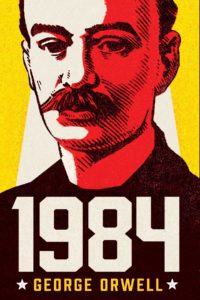
George Orwell, 1984
Any discussion of science fiction and politics needs to begin with George Orwell’s 1984. The main character in 1984, Winston Smith, rebels against the rigid ideas and oppressive rules of his government. As is familiar to most, the face of the ruling party, Big Brother, is watching Winston’s every move. Winston begins to secretly engage in subversive behavior. Sexual relationships are strictly regulated by the state, but Winston pursues an illicit affair with a woman named Julia. The state will not permit any form of dissension, but Winston seeks out a leader of a rebel group trying to overthrow the Party. The state censors treasonous books, but Winston reads manifestos that challenge the Party orthodoxy. The tension builds as Winston takes greater and greater risks, and his relationships with Julia and the rebel leader take unexpected turns. 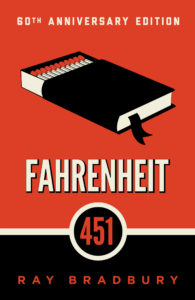
Ray Bradbury, Fahrenheit 451
Guy Montag is a fireman, a person who burns books on behalf of an oppressive state that has banned all forms of intellectual pursuits, including reading. At the beginning of Fahrenheit 451 (the title derives from the temperature at which a book might burn), Montag is a naïve and unsuspecting cog in the censorship wheel. But he slowly awakens when he meets a young girl named Clarisse who is inquisitive by nature and challenges Montag to see the importance of books and critical thinking. Through a series of encounters with liberal, and more importantly illiberal, members of his community, Montag embarks on a suspense-filled journey from unenlightened follower to insurgent.
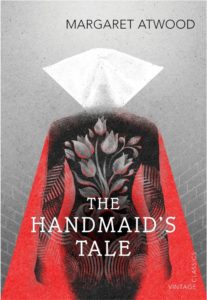
Margaret Atwood, The Handmaid’s Tale
It is third on this list, but if the list was My Favorite Political Sci-Fi Thrillers, then Margaret Atwood’s The Handmaid’s Tale would be #1. I love this book because it’s such a simple story, but the implications are monumental. Written with precise, penetrating prose, Atwood masterfully tells the story of a Handmaid, a woman designated by the state to bear children. Offred—she’s “of Fred” because women are assets unentitled to something as basic as a name—is caught between her desire to be free and the shelter of her restrictive life. As Offred pushes against the boundaries of who she is required to be, she finds a version of herself that frightens her. As Atwood explores issues of sex, gender identity, motherhood, and subjugation, she slowly builds a disquieting world riddled with fear—a world the reader is forced to stew in.
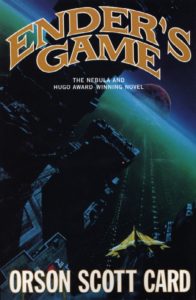
Orson Scott Card, Ender’s Game
If mind-blowing twists are your idea of a great thriller, then Orson Scott Card’s Ender’s Game is the book for you. And it’s not just the big twist towards the end of the book. Orson Scott Card adeptly paces this roller coaster ride with harrowing and unexpected rises and falls of the main character, Ender Wiggin. Ender is just a child, but after enduring a brutal brother, beatings from jealous cadets at his military academy, and a steady stream of military brass that want to use Ender’s enormous talents for their own good, Ender becomes an elite military commander. In the face of ruthless leaders demanding victory at any cost, Ender demonstrates that not only does he have the military chops, but he has the capacity for compassion that his leaders are so desperately missing.
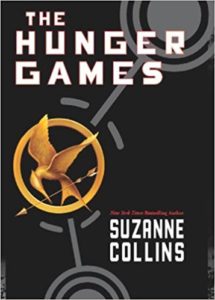
Suzanne Collins, The Hunger Games
The posterchild for dystopian Y.A. novels, Suzanne Collins’ The Hunger Games is the chilling story of a sadistic nation that forces teenagers selected by lottery to fight one another to the death. As punishment for a previous rebellion, one boy and one girl from each of the 12 districts in Panem are selected to pay tribute to the Capitol. This gladiatorial fight, known as the Hunger Games, is televised throughout the nation in an over-the-top reality television program that feeds the Capitol’s thirst for violence. Written as a trilogy, The Hunger Games introduces readers to 16-year-old Katniss Everdeen. She’s a mix of heroism and stoicism—strategic and wise beyond her years. Early on in the book, Katniss volunteers herself when her younger sister is selected by lottery to fight in the Hunger Games. All we need to know about Katniss is learned in this single act of sacrifice. Katniss is strong, resilient, and ultimately defiant. She must outlast and kill her fellow tributes, but the real enemy she must overcome is the Capitol.
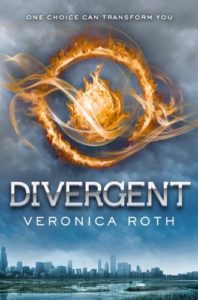
Veronica Roth, Divergent
In Veronica Roth’s Divergent, teenagers like the main character Tris Prior must choose to live in one of society’s five factions. Tris comes from Abnegation, which prioritizes selflessness, but rejects her family’s faction for Dauntless, the faction of the brave. In order to be initiated into Dauntless, Tris must compete against fellow Dauntless initiates in competitions rife with violence. Tris must navigate the political machinations of initiates, as well as the Dauntless leaders who will decide her fate. During the initiation process, she falls in love with a mysterious instructor and learns that he is unlike the other Dauntless leaders. She soon discovers that whatever special powers he has, she has them as well. Together, they uncover a plot by one of the factions to take control over the society. Divergent, which like The Hunger Games is a dystopian trilogy, is jam-packed with suspenseful action sequences and secret conspiracies that need to be unraveled.
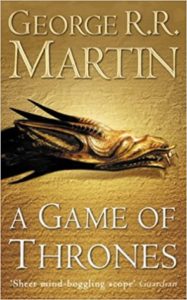
George R.R. Martin, A Game of Thrones
George R. R. Martin’s A Game of Thrones is filled with political intrigue, backstabbing characters, and shocking twists. It is far more fantasy than science fiction, but I love this book and the entire Song of Ice and Fire series so much, I had to sneak it in. It doesn’t get much more political or thrilling than A Game of Thrones. As a piece of genre-bending speculative fiction, A Game of Thrones delivers the kind of suspense and surprise that thriller fans will love. The story centers around the different powerful houses of Westeros which wish to lay claim to the throne—hence the title of the book. Competition for the throne is fierce, and George R.R. Martin’s characters run the gamut from conniving queens like Cersei Lannister to ethical warriors like Eddard Stark to behind-the-scenes manipulators like Lord Petyr Baelish. It’s impossible to do justice to the breadth of interesting characters or enthralling interwoven plotlines in a few words, so you may just have to take my word on this one—it’s as good as it gets.
















